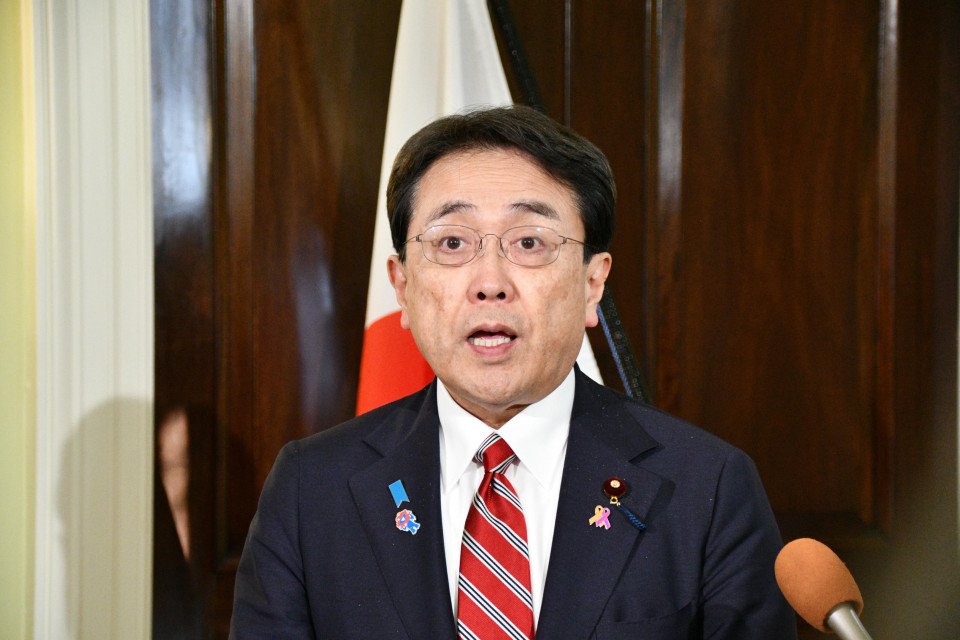The United States is increasingly recognizing the importance of Japan for its economy, the Asian country’s chief tariff negotiator said Friday, after holding discussions with U.S. Cabinet members.
Ryosei Akazawa made the remark after discussing trade, nontariff barriers and economic security with U.S. Commerce Secretary Howard Lutnick and U.S. Trade Representative Jamieson Greer in Washington.
Japanese officials declined to say whether Nippon Steel Corp.’s plan to acquire United States Steel Corp. was discussed during the meeting.

Japan’s chief tariff negotiator Ryosei Akazawa speaks at a press conference in Washington on May 23, 2025. (Kyodo) ==Kyodo
In the third round of bilateral talks, Akazawa agreed with the U.S. officials on the need to conclude a trade deal as soon as possible, although it appears increasingly unlikely that Japan will secure major concessions.
Shortly after arriving in Washington, Akazawa held “candid” discussions with Lutnick and strongly requested the removal of additional tariffs imposed on Japan, according to the Japanese government.
To reach an agreement that will benefit both countries, Akazawa and Lutnick confirmed that they will continue to hold constructive discussions, the government said.
Prior to the negotiator’s arrival in Washington, Japanese Prime Minister Shigeru Ishiba said he and U.S. President Donald Trump had spoken by phone and agreed that the forthcoming talks should be “productive.”
Ishiba said the call, which lasted about 45 minutes, was held at the request of Trump, who has imposed a barrage of tariffs on imports from Japan and other countries.
In early May, Akazawa and U.S. Treasury Secretary Scott Bessent agreed to speed up ministerial talks from the latter half of this month with the aim of striking a “mutually beneficial” deal as early as June.
Before leaving Tokyo, Akazawa said Japan’s position that the new tariffs are extremely regrettable remains unchanged, and it will continue urging the Trump administration to remove them.
“An agreement cannot be reached unless it is a win-win situation for both sides,” he said.
But recent preliminary trade agreements the United States has struck with Britain and China suggest that Trump has no plans to roll back his administration’s baseline 10 percent tariff on imports from nearly all countries, part of its so-called reciprocal package.
Trump has also insisted that auto and other sector-based tariffs imposed by his administration on national security grounds will remain in place, indicating that only the country-specific duties, which are added to the 10 percent universal levy and currently paused until early July, are open to negotiation.
Akazawa’s talks came two days after Japanese Finance Minister Katsunobu Kato met with Bessent in Canada to discuss currency issues related to the tariffs.
Bessent was not present at Friday’s talks and Akazawa may return to Washington as early as next week
Under Trump’s reciprocal tariff regime, announced on April 2, Japan faces a country-specific tariff of 14 percent for a total rate of 24 percent.
Eliminating the Trump administration’s new 25 percent tariffs on cars and auto parts is especially critical for Japan.
In an interview with Kyodo News in Tokyo on Friday, Ishiba said calling for the elimination of all the additional tariffs is “our unwavering stance.”
However, given the Trump administration’s rigid tariff stance, sources close to the bilateral talks said earlier this week that Japan has begun considering backing off from seeking a full removal and is exploring how far to compromise to secure an early deal.
Related coverage:
Japan PM says June talks with Trump to be “milestone” for tariff deal
Japan, U.S. agree dollar-yen rate mirrors economic fundamentals
U.S. rejects Japan’s exemption from “reciprocal” tariffs

AloJapan.com